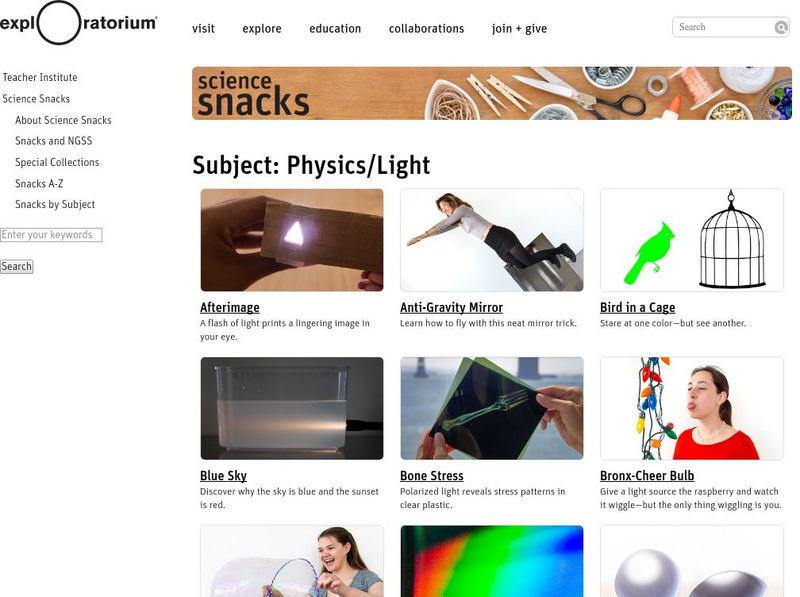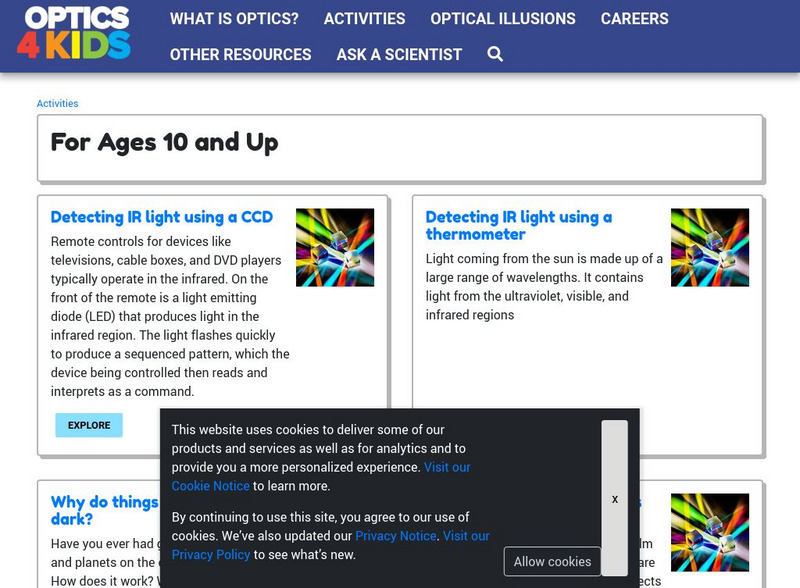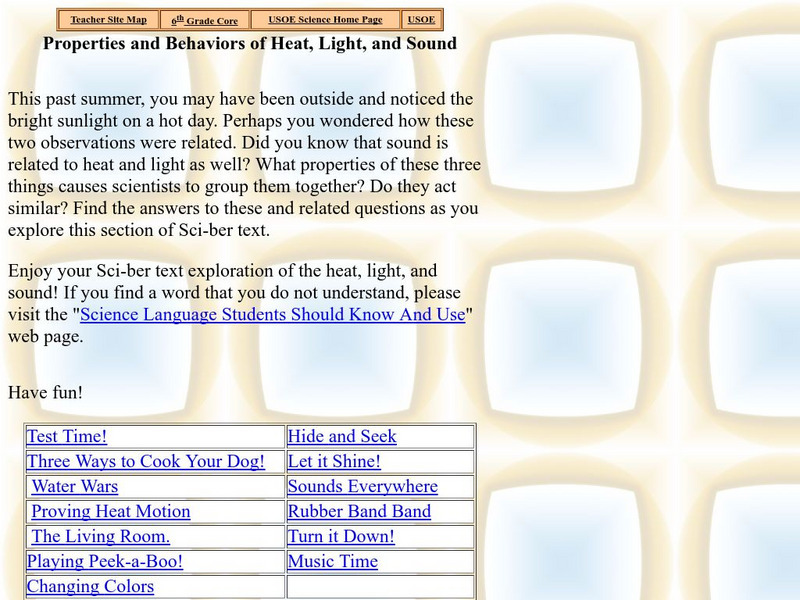Hi, what do you want to do?
Curated OER
How to Celebrate Kwanzaa on Your Campus
An article details everything you need to know about celebrating Kwanzaa at your school. An opening-day ceremony starts the seven-day holiday celebration followed a daily routine that includes a greeting, candle lighting, reciting an...
EngageNY
TASC Transition Curriculum: Workshop 8
Lights, camera, action! Math educators consider how to improve their instruction by examining a model of the five-practice problem-solving model involving a movie theater. Participants examine cognitive demand in relation to problem...
Physics Classroom
The Physics Classroom: Reflection/light Ray Model: Specular/diffuse Reflection
A series of incident rays and their corresponding reflected rays are depicted in the diagrams in this tutorial. Each ray strikes a surface with a different orientation; yet each ray reflects in accordance with the law of reflection.
Florida State University
Florida State University: Light and Color: Reflection of Light
An in-depth discussion on reflection of light can be found here. Among the topics discussed include are the difference between specular and diffuse reflection, concave and convex mirrors, facets, total internal reflection, and much more....
Smithsonian Institution
Smithsonian Learning Lab: Turn About's Fair Play! Mirrors and How They Reflect
Teachers can download this teaching package that looks at light and symmetry through the use of mirrors. Learners will enjoy the nine mirror challenges, along with the hands-on activities described in the lessons. Teachers will...
Texas Education Agency
Texas Gateway: Light: Reflection and Refraction
This tutorial reviews over the properties of light. Students will learn about reflection and refraction through videos, questions, and interactive activities.
Physics Classroom
The Physics Classroom: Wavelike Behaviors of Light
How light waves demonstrate their wave nature by reflection, refraction, and diffraction.
Open Ed
Open Ed Sci: 6.1 Light & Matter
How does a one-way mirror work? Though most everyone knows that one-way mirrors exist, having students model how they work turns out to be a very effective way to develop their thinking about how visible light travels and how we see...
Exploratorium
Exploratorium: Science Snacks: Physics/light
Here is a large collection of simple science class activities for understanding the physics of light.
Physics Classroom
The Physics Classroom: Light Waves and Color
The behavior of light waves is introduced and discussed. Also, polarization, color, diffraction, and interference are introduced and discussed thoroughly as supporting evidence of the wave nature of light.
University of Colorado
University of Colorado: Ph Et Interactive Simulations: Bending Light
Explore bending of light between two media with different indices of refraction. See how changing from air to water to glass changes the bending angle. Play with prisms of different shapes and make rainbows.
Scholastic
Scholastic: Study Jams! Science: Light Absorption, Reflection, & Refraction
A video and a short quiz on the properties of light.
Physics Classroom
The Physics Classroom: Light Absorption, Reflection and Transmission
This tutorial explains light absorption, reflection and transmission in a clear and concise manner. Provides a "Check Your Understanding" section as well as additional links on color and light.
Physics Classroom
The Physics Classroom: Reflection and the Ray Model of Light
A four-lesson tutorial on the reflection and the ray model of light. These complete tutorials include informational text, interactive activities, animations, and quick, interactive comprehension questions.
TeachEngineering
Teach Engineering: How Does a Light Sensor Work?
A mini-activity, which uses LEGO MINDSTORMS NXT intelligent bricks and light sensors gives students a chance to investigate how light sensors function in preparation for the associated activity involving the light sensors and taskbots.
Other
Propagation of Light Using Geometry
A discussion of Christian Huygens' contribution to wave optics, and particularly to our understanding of the reflection and refraction of light. Excellent diagrams and a geometric proof on why the law of reflection is mathematically...
BBC
Bbc: Gcse Bitesize: Why Do Scientists Think That Light and Sound Are Waves?
Light travels as transverse waves and can travel through a vacuum. Sound travels as longitudinal waves and needs to travel through a solid, liquid or gas. Read about the properties of light and of sound, and learn the differences between...
Georgia State University
Georgia State University: Hyper Physics: Total Internal Reflection
This physics department site provides a definition and explanation of the phenomenon of total internal reflection. Includes a diagram and an equation for calculating the critical angle for light approaching a surface.
Florida State University
Florida State University: Molecular Expressions Microscopy Primer: Light and Color Refraction of Light
Comprehensive and sophisticated overview of light refraction includes an historical overview of the subject and explanations of the mathematics that underpin refractive indexes, the relative index of refraction, Snell's law, and light...
American Museum of Natural History
American Museum of Natural History: Ology: See the Light
Reflection, refraction, and the colors that make up white light is explored through lab activities after reading a brief background about light energy.
Optical Society
Optical Society of America: Exploring Science of Light: Intermediate Activities
A collection of intermediate experiments, for students aged ten and up, for exploring the magnification, reflection, and refraction of light.
TeachEngineering
Teach Engineering: Learning Light's Properties
Learners learn the basic properties of light--the concepts of light absorption, transmission, reflection and refraction, as well as the behavior of light during interference. Lecture information briefly addresses the electromagnetic...
ClassFlow
Class Flow: What Is Light?
[Free Registration/Login Required] This flipchart reviews the characteristics of light and its properties. Students are given examples of reflection, refraction, and lens types. An assessment component is included.
Utah State Office of Education
Utah Science: Properties and Behaviors of Heat, Light and Sound
How can scientists lump heat, light and sound together when investigating properties and behaviors? This learning module will address that question through a series of activities.




















